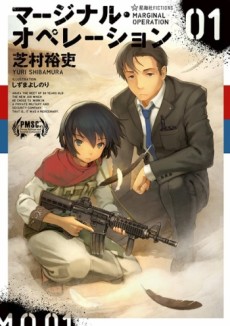MARGINAL OPERATION
STATUS
COMPLETE
VOLUMES
16
RELEASE
January 25, 2021
CHAPTERS
93
DESCRIPTION
Our hero Ryouta Arata is an otaku who's just lost his job after the dissolution of his company. Unwilling to return to his old NEET ways, he applies online to a private military security company, thinking the benefits to be promising. After what appears to be a baffling test, he's assigned to be an "operator of operators" and begins his training in a foreign country. Little does he know, the life of a private mercenary is far more grueling than he could have ever imagined!
(Source: J-Novel Club)
Note: Chapter count includes 5 extra chapters.
CHAPTERS
RELATED TO MARGINAL OPERATION
REVIEWS

Rework7288
78/100Takes a surprising premise and executes it brilliantly, but is let down by a rushed ending.Continue on AniListThis Review Has Been Substantially Updated
I originally gave this manga a score of 89 based on its first 13 volumes. Since then, volumes 14, 15, and 16 have been released in English, and the series has ended. I found those volumes disappointing in two respects, which I will elaborate on at the conclusion of this review, and have therefore revised my score down to a 78. I still think the series is good and is worth your time, but I can no longer recommend it as enthusiastically as I previously did.
Original Review
I observed in another review that because writing reviews on AniList.co is a lot of work, and because it's hard to find 400 words of "this is great" or "this stinks," I usually write reviews when I am in some way conflicted about a manga—most often when I feel let down by one. (For example, I am currently working on a review of Hell's Paradise: Jigokuraku, but I'm struggling to find anything to say beyond "this manga is Just Good and I think you will really enjoy it." Who knows whether I will ever manage to publish that one.)
This review is the rare exception. I don't feel let down by Marginal Operation. Just the opposite—it is much better than I expected. I have some reservations about the series, but on the whole it is excellent, and if you read this review and still think it sounds good, I think you will really love Marginal Operation.
Minor Spoiler Warning!
This review is going to have some spoilers of the first three volumes, because the premise of the series changes in an important way after that point, and it is impossible to talk seriously about this series' merits without discussing what the series is really about. And there is also a very minor and general spoiler of a decision Arata makes around volume 9.
Background
The protagonist of Marginal Operation, Arata, starts off as a NEET with almost no employable skills. He has a very good memory and the stereotypical "video gamer" suite of pattern-recognition and decision-making skills, but nothing he can make money with. He takes a desk job at a private military company because it sounds easy and it's the only way to make rent. I won't go through his moral arc in detail, but he quickly realizes three things:
-
He is very, very good at being an "operator of operators"—a tactical commander of mercenary forces.
-
He cannot tolerate the "do anything to make money" morality that prevails at his current employer.
-
In particular, he is disgusted by his company's use of child "soldiers" (read: untrained slaves who happen to have guns) as bait.
Arata gets himself assigned to "operate" a unit of about 30 child soldiers, puts a stop to the use of that unit as bait, and gets them out of a couple of very sticky situations where any other "OO" would have abandoned them. (This "harm reduction" approach to horrifically immoral situations is a recurring theme in Marginal Operation—more on that later.)
The third volume ends, and the series proper really begins, with Arata (and his lieutenant Omar) having a falling-out with his employer and effectively adopting the child-soldier unit, who by that point are devoted to him. His overriding goal for the rest of the series is to protect these children and give them a normal, happy, peaceful future. But the core problem is that his only skill is war. And the kids, who are all 12–13 at the start of the series, are from a poor country in the Middle East, so without him they will have nowhere to turn.
That brings us to the true premise of the series: The only way for Arata to provide for these kids is to start his own private security company.
Using the children.
As soldiers.
The Bad
I'll start with what I don't like about Marginal Operation. Surprisingly, there's not much.
First, events and circumstances in Marginal Operation are a bit contrived to make Arata the good guy. I can think of two good examples of this.
-
We are told that there is literally no way for Arata to provide for these kids other than running a military company using them as soldiers. And if you accept that premise, his actions are at least understandable. But it's a bit hard to accept that premise, because we see throughout the series that Arata is extremely intelligent, a shrewd negotiator, a natural leader, and an effective organizer. It feels a bit contrived to say that Arata couldn't have found some way of providing for these kids other than putting guns in their hands.
-
The children in Arata's care love him and Omar, are happy working for him, and seem relatively well-adjusted. Marginal Operation is not a lighthearted series, and it shows real psychological costs to what Arata and his kids are doing. But on the whole, events in Marginal Operation seem to vindicate Arata's opinion that employing the children as soldiers is the least-bad option for them.
To some extent, I think this is inevitable: If Marginal Operation were about the kind of monsters who actually use child soldiers in real life, it would be totally unreadable; nobody can root for that sort of scumbag. And if its protagonists all had the kind of trauma that being a child soldier actually causes, the series would be too tragic to enjoy. So I don't regard this as a fatal problem with the series. But it is at least a minor flaw.
Second, at about Volume 9, Arata expands his operations dramatically, employing hundreds more children. He has good reasons for this—those children were from slums where they had no other option but sex slavery, he takes them in for their well-being rather than because he wants a bigger company, and he has a plan for ensuring that in the long term these kids have a good future—but I still don't like it. My basic problem with the expansion is this: When Arata was responsible for 25-ish children, he could treat them as if they were his own children, his own family. And it was obvious that he did think of them as his own children—one point that is absolutely undeniable throughout the series is that he is completely devoted to the children in his care. Whatever decision he made, it was obvious that he made it out of love for those children. And that earned him, in my opinion, a lot of leeway—enough to let me suspend disbelief and accept the premise of the series.
But once Arata expands his operations, that moral pillar of the series gets a little bit shaky. Arata simply can't feel that way about all of his charges—he is obviously devoted to all of them, but he can't have an individual relationship with each of them. It is a little harder to accept that he is the good guy when he's running a company of hundreds of child soldiers he recruited from the slums than when he had a platoon of two dozen that he personally rescued. This, too, is a comparatively minor criticism. Arata is clearly devoted to the children; the children are clearly devoted to him. But I felt it was worth mentioning.
The Good
Now for what I love about Marginal Operation.
First, the premise is great. I know that I said earlier that the premise is a "hard sell." But Marginal Operation sells it. And it turns out that this premise is worth selling—it makes for a really, really interesting story. The action/tactical thriller elements of the series are great in their own right, but the relationship between Arata and his wards makes them, and the series as a whole, so much better in so many ways:
-
Conflicts have intense emotional tension. Arata's original platoon is like a family. The thought of any of them dying, or even being seriously hurt, is upsetting. Even when Arata expands his operation, the idea of even one of his soldiers dying has an emotional punch to it. (Imagine, for comparison, a war story in which a handful of recently-introduced adult mercenaries die—not much of an impact.)
-
Arata's always the underdog. Even though Arata's troops are well-trained, and even though he's a brilliant leader, the conflicts always have a satisfying root-for-the-underdog feeling.
-
Moral aims are comprehensible. Arata is single-mindedly devoted to his wards and will do anything to protect and provide for them. But he is also, deep down, a softie (which is why he adopted a bunch of kids instead of getting rich blowing up villagers for oil). He doesn't want to commit atrocities; he wants to intervene when he and his troops can protect others. This might feel phony in a story about regular mercenaries, but it feels real in Marginal Operation.
-
The characters' bonds are real and deep. This one speaks for itself. The emotional bonds between Arata and his wards, and among those wards, are convincing and have a poignancy that ordinary comrades-in-arms–type relationships sometimes lack.
Second, Arata himself is fantastic. As I said, his moral arc is pretty quick—he goes from a feckless NEET to someone with blood on his hands and lives depending on him in the span of months, and he rises to the occasion spectacularly. From that point onwards, his love for his children and his dedication to providing for them never wavers in the slightest. He has flaws, of course—all good characters do. But in my opinion, it is impossible to watch him struggle to lead these kids, protect them, provide for them, and build a future for them without rooting for him and becoming invested in his struggle.
Third, Everything about Marginal Operation is well-executed, so the strengths of the premise and protagonist can really shine through:
-
The overall characterization is very good. Arata's wards are complex, likeable characters. So is Omar. The supporting characters are interesting; characters from early volumes have a way of resurfacing that feels natural and contributes to the story. Even the villains are good—some of the other military characters feel a bit cartoonishly evil, but (unfortunately) their actions are totally within the historical norm for military atrocities.
-
The plotting is excellent. Conflicts are exciting, intense, and plausible; solutions almost never feel contrived.
-
Military matters have an air of realism. Fighting is mostly experienced on the tactical level (from the perspective of Arata, who usually is not directly fighting) but is thrilling anyway. Gunplay and the like do occur and are similarly well-executed. Arata's tactical brilliance feels real—that is, it feels as though his decisions are actually very good; we're not merely told that they're very good. And it never feels as though the tactical situation is contrived to create an opportunity for Arata to be brilliant.
-
The art is very good. It's not flashy, but it supports and never detracts from the story.
Conclusion
For some people, a manga about young soldiers that depicts them as anything other than miserable, traumatized victims will never work. And that's totally fair. But for anyone who feels like the premise of Marginal Operation could work, so long as it's well executed, I recommend Marginal Operation whole-heartedly. It is very good, and there's really nothing else like it.
Update
Everything that went before is based on the first 13 volumes. Unfortunately, volumes 14–16 let the series down in a big way. There are two major problems with the final three volumes, and they share a common theme: This series needed more time.
First, let's start with the plotting. The ending of the final arc of the story comes out of nowhere. If at the end of volume 14 you had asked me how long it would take to finish the war Arata was currently engaged in, I would've said at least three volumes. Marginal Operation did it in two, counting a weird side story and the series finale. The pacing of volumes 15 and 16 is just really off.
The manner in which that ending came about was disappointing, too. Although Marginal Operation had always taken some liberties with the details of warfare—Arata's C&C technology, for example, is probably a decade ahead of anything currently on the market—the tactics and strategy were sound. In the final volume, some of that faithfulness to reality went out the window for the sake of a strange in-person confrontation that went nowhere.
Second, there is another choice that the author made that I found objectionable. The following spoilers are very specific, because there's really no other way to do this part of the review. Sorry.
The author has Arata and Jibril (one of the soldiers who's been with him since the beginning) wind up together. Jibril had been increasingly obvious about her infatuation with Arata over the latter half of the series, but up until the very end Arata realized how wrong it would be to take advantage of that. And then the series ends with her being very direct about her interest in him, and him responding, basically, "I'm interested, but not just yet"—and also kissing her on the lips.
Remember, she's 14. He's twice her age, her commanding officer, and effectively her adoptive dad.
This spoiled a lot of the goodwill I had towards Arata. It was, in my view, totally inappropriate. If this had happened after a couple more timeskips (say, once Jibril was an adult), I'd be okay with it. And I think that probably was the author's original intent, which is why I say that this series really needed more time. But the story we wound up getting concluded with Arata acting like a sex offender, and that left a really sour taste in my mouth.
-
SIMILAR MANGAS YOU MAY LIKE
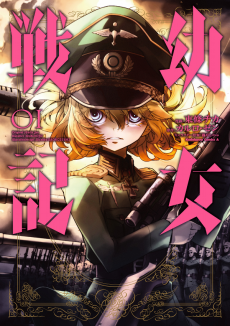 MANGA ActionYoujo Senki
MANGA ActionYoujo Senki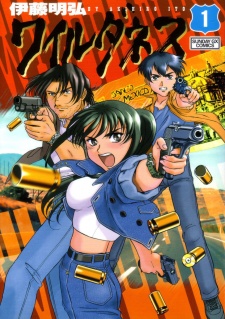 MANGA ActionWilderness
MANGA ActionWilderness MANGA ActionGUNSLINGER GIRL
MANGA ActionGUNSLINGER GIRL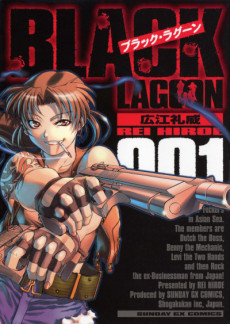 MANGA ActionBLACK LAGOON
MANGA ActionBLACK LAGOON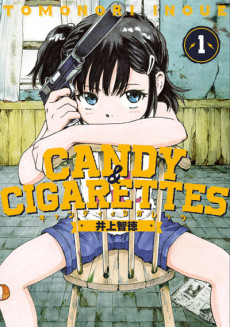 MANGA ActionCANDY & CIGARETTES
MANGA ActionCANDY & CIGARETTES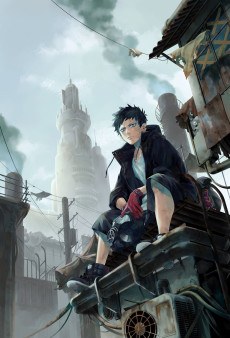 ONE SHOT ActionLAWLESS KID
ONE SHOT ActionLAWLESS KID
SCORE
- (3.45/5)
MORE INFO
Ended inJanuary 25, 2021
Favorited by 32 Users

